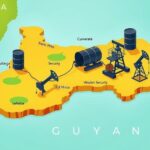U.S. Enhances Security Cooperation with Oil-Rich Guyana Amid Venezuelan Disputes
U.S. Secretary of State Marco Rubio offers Guyana enhanced security cooperation as border disputes with Venezuela escalate. Guyana’s oil production is on track to exceed that of Qatar and Kuwait per capita. The United States seeks to deepen its relationship with Guyana akin to Gulf nations, emphasizing the importance of this partnership in the face of Venezuelan threats.
On Thursday, United States Secretary of State Marco Rubio visited Guyana with a proposal to extend Washington’s security assistance to the oil-rich nation amidst escalating border tensions with Venezuela. Guyana, which has significantly increased its oil reserves over the past decade, is on track to become the world’s top oil producer on a per capita basis, surpassing established producers like Qatar and Kuwait.
In light of rising tensions between Guyana and Venezuela, the U.S. intends to formalize security cooperation through a memorandum of understanding that Rubio is set to sign. This trip follows his discussions with Caribbean nations in Jamaica and will also include a stop in neighboring Suriname, which is experiencing its own oil production growth.
The Trump administration views the relationship with Guyana as similar to those with Gulf Arab nations that invite U.S. military presence for security. Mauricio Claver-Carone, the U.S. special envoy to Latin America, emphasized the strategic importance of protecting Guyana, stating that “the security of Guyana is a key priority for us.”
Guyana’s President Irfaan Ali, who is poised for reelection this year, has been advocating for closer defense ties with the United States, including joint maritime patrols. Venezuela’s claim over the oil-rich Essequibo region exacerbates the tensions, as the president, Nicolas Maduro, has faced sharp criticism from Rubio. Earlier, Guyana reported a Venezuelan military vessel’s incursion into its waters, a claim Venezuela denied.
The U.S. government prioritizes increasing oil production for both economic benefits and security needs, signaling a clear departure from previous climate-focused policies. ExxonMobil gets a central role as it anticipates increasing oil production in Guyana to 1.3 million barrels per day by 2030, a substantial contrast to Venezuela’s declining output due to mismanagement and sanctions.
In summary, U.S. Secretary of State Marco Rubio’s visit to Guyana signals a robust commitment to enhancing security cooperation amid increasing tensions with Venezuela over territorial claims. By fostering a partnership similar to those with Gulf states, the U.S. aims to safeguard Guyana’s burgeoning oil industry, further solidifying its geopolitical interests in the region. Guyana’s collaboration with Washington reflects its aspirations for increased defense and growth in oil production, crucial for its economic stability.
Original Source: homenewshere.com








Post Comment